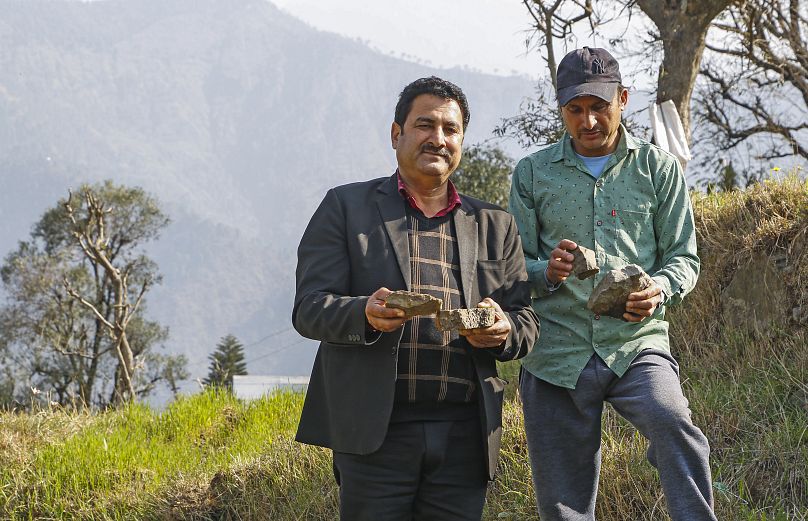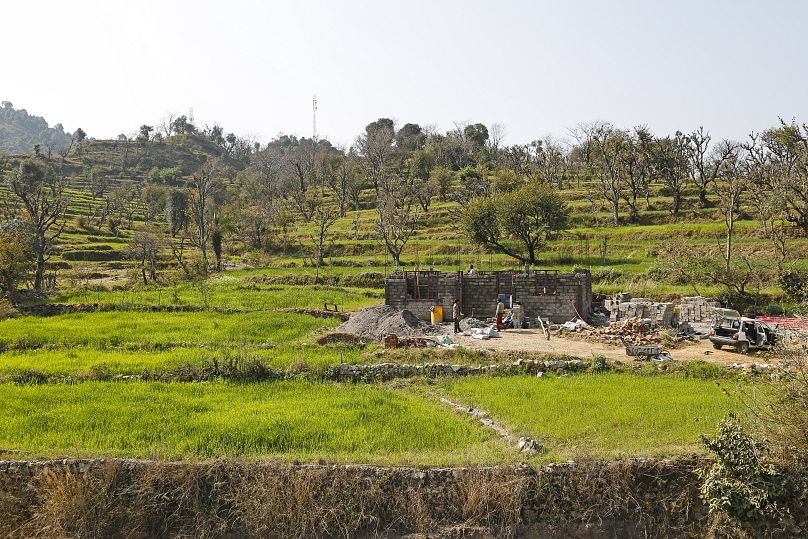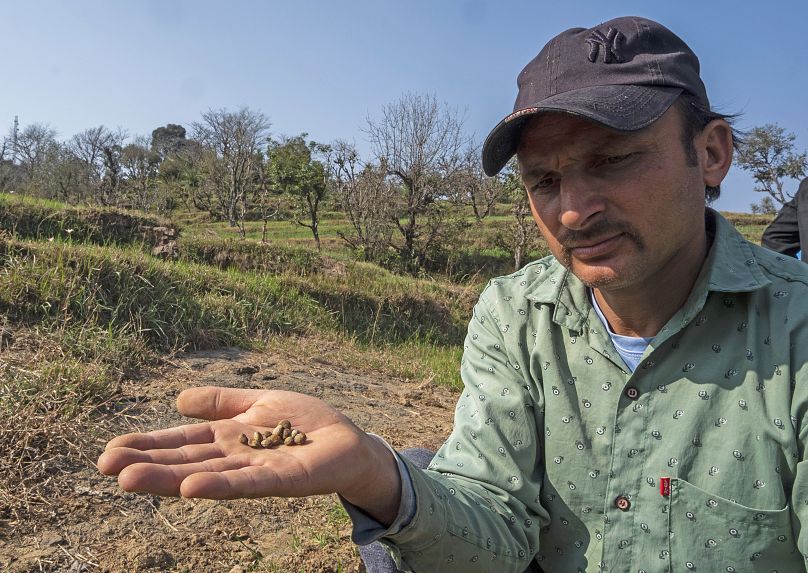India has found what it was looking for in Jammu and Kashmir, but locals fear the consequences of ‘fiddling with nature’.
More than one billion people in India welcomed the first ever discovery of lithium deposits in the country last month.
The news arrived from Salal, a remote village in the Reasi district on the Indian side of Jammu and Kashmir.
Around 5.9 million tonnes of this soft white metal were found on 9 February, following deep drilling by the Geological Survey of India (GSI) in the area. It is a core component in batteries, which the electrification of the world depends heavily on.
1/1
Skip Ad
Continue watching
after the ad
Visit Advertiser websiteGO TO PAGE
PLAY

Latest
Video Settings
Full Screen
About Connatix
V452730

Read More

Read More

Read More

Read More

Read More

Read More

Read More

Read More
UK man first to be jailed for ‘cyberflashing’ undernew legislation in England
 (new Image()).src = ‘https://capi.connatix.com/tr/si?token=604675c4-ea89-46c9-9817-5ed115e7bf41&cid=83b16131-8326-440c-9a78-470bcd2870e2’; cnxps.cmd.push(function () { cnxps({ playerId: “604675c4-ea89-46c9-9817-5ed115e7bf41” }).render(“29572e93412441b3b0dc992bd9167d8a”); });
(new Image()).src = ‘https://capi.connatix.com/tr/si?token=604675c4-ea89-46c9-9817-5ed115e7bf41&cid=83b16131-8326-440c-9a78-470bcd2870e2’; cnxps.cmd.push(function () { cnxps({ playerId: “604675c4-ea89-46c9-9817-5ed115e7bf41” }).render(“29572e93412441b3b0dc992bd9167d8a”); });
“The presence of the lithium in the area was known to us since 1999,” a government official, who wishes to remain anonymous, tells Euronews Green.
Two geologists had suggested exploring the bauxite rock to assess the quality of the lithium deposits, the official says. But there wasn’t enough demand to make this economically viable.
The boom in electric cars – spearheaded by Elon Musk’s success with Tesla – changed everything, sending the demand for lithium skywards.
Lithium found in India is technically in the ‘inferred’ category – meaning further tests are needed to check its quality. But the official claims that “salal lithium is almost three times better than normal grade lithium.”
If the country’s hopes are realised, it stands to hold the fifth-largest lithium reserves in the world.
How do locals feel about the lithium discovery?
Krishan Kumar, a local, believes that the discovery of lithium-rich bauxite deposits has come as a mixed blessing for the residents of Salar.
He said that villagers are happy for the country but are sad for themselves because the village has to be relocated in order to mine the bauxite terrain.
“Our days in Salar are limited as the government will start the project to extract lithium soon,” Kumar says.
“We will be served notice sooner or later to evacuate the area. I am sad about losing my home, village and the green fields,” he says, adding that he is confused about whether to celebrate or mourn the discovery.
“I personally don’t want the extraction project to start in the village,” Kumar said.
“I believe fiddling with nature can be dangerous and at some point we will have to bear its consequences.”
Kumar is not the only one worried about losing his home. There are around 10,000 people living in Salal, and many are concerned about their future.
Preetam Singh, Salal village head, says that a lot of villagers are coming to him with their concerns, and questions about the roadmap for relocation.
“People are worried, there is no doubt about that, and they often visit me saying what are they going to do and where shall they be relocated,” Singh says.
“The government should relocate all the villagers to a safer place and provide them [with] compensation five times more than the actual cost of the land,” he says, adding that the extraction of lithium should first benefit the people of Jammu and Kashmir.
India is aiming to become self-sufficient in lithium
Briefing reporters last month, Mines secretary Vivek Bharadwaj said the discovery would be a way for India to become “atmanirbhar”, meaning self-reliant.
It’s a frequent slogan of Modi’s government, and lithium is an understandable target.
India is one of the biggest markets for gadgets such as smartphones, smartwatches, and laptops that run on lithium-ion batteries. To meet this demand, the country imports lithium from countries like China, Australia and Argentina, spending around a billion euros annually.
India is also the fourth largest car manufacturer in the world and is aiming for 30 per cent of private cars to be EVs by 2030.
Professor of geology at the University of Jammu, Pankaj Srivastava believes that the lithium bonanza will eventually make India self-reliant in manufacturing lithium-ion batteries as it transitions to renewable energy. The country has committed to reaching net zero by 2070.
“Lithium is an energy element and India was lacking in lithium. As a result, a search for the metal was taking place across the country in order to be self-sufficient,” Srivastava says.
“This discovery is going to set a milestone in the lithium industry.”
Aabid Bhat, an EV engineer, expects that India will be in a position to start exporting lithium to other countries “in a matter of a few years.”
While, “domestically, more and more people will shift from purchasing cars run on fossil fuels to EVs as they will cost 10-15 per cent less than today because of the availability of raw materials within the country.”
By 2030, Bhat predicts that India’s transport network will run mostly on lithium-ion batteries.
But energy experts have given a more conservative timeline.
“International experience shows that environment permitting, mine development can take 10 years or more,” Siddharth Goel, a senior policy advisor at the International Institute for Sustainable Development told the Independent.
“In the short-term, India still needs a strategy to source critical minerals, for its 2030 clean energy and EV targets.”
The government is inviting companies to bid for the lithium reserves at an auction in June.
Environmentalists are divided on the cost of lithium extraction
The experience of lithium extraction elsewhere also gives pause for thought, and more work is needed to understand the ecological sensitives of the region.
Local environmentalists believe that the extraction and refining of lithium exposes the ecosystem to poisoning and health-related problems, as well as creating water scarcity.
“Lithium extraction contributes to an increase in carbon dioxide and other greenhouse gases in the atmosphere,” says a Kashmir-based environmentalist, who wishes to remain anonymous.
“During the extraction procedure all trees in the area have to be removed thus making flora its first causality,” he adds.
Jammu and Kashmir are in India’s highest seismic zones of 4 and 5, so are prone to earthquakes. The environmentalist warns that deep drilling may endanger the lives of the people living in the entire region.
“The other issue is about the misuse of water in its refining,” he says.
“To obtain one tonne of lithium requires 500,000 gallons of water which of course will cause water scarcity in Jammu and Kashmir.”
There are precedents that India will want to avoid. In Chile’s Atacama salt flats, for example, Friends of the Earth reports that mining consumes, contaminates and diverts scarce water resources away from local communities.
C M Seth, another environmentalist based in Jammu, has a different take, however. He says that deep drilling will not be required in Sala to extract the lithium, so there won’t be major damage to the environment.
“The government will install the best machinery to minimise the misuse of water to obtain lithium and its leakage,” Seth says.
“In Salal there is only the surface removal of the rocks that contain the precious element and therefore no deep drilling will be required.”
Given that most vehicles in India currently run on petrol and diesel, he suggests that the overall environmental gains outweigh any local disturbance.
“If all vehicles are switched over to EVs [they will stop contributing to] air pollution and global warming,” he says, adding that this will mitigate the impact of climate change in India.

















